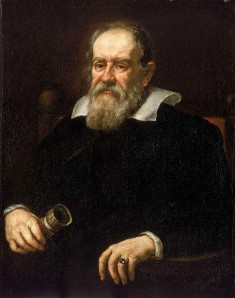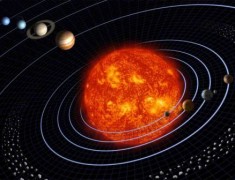| Galileo Galilei | |
|---|---|
 |
|
| Physicist | |
| Specialty | Astronomy, physics, math |
| Born | Feb. 15, 1564 Pisa, Duchy of Florence, Italy |
| Died | Jan. 8, 1642 (at age 77) Arcetri, Grand Duchy of Tuscany, Italy |
| Nationality | Italian |
Galileo Galilei’s contributions to the realms of physics, astronomy, math, and the sciences were hugely significant and forever changed the course of human history. Some of his discoveries and ideas helped make him one of the most recognized thinkers of all time.
Galileo’s Early Years
Galileo was born in Pisa, Italy, as the son of a musician. His father helped teach his son how to play musical instruments and it would seem young Galileo would follow in his father’s professional footsteps. While this was not the case, he did inherent quite a bit of his father’s anti-authoritarian charm. The notion he should always question authority would eventually lead to Galileo making great scientific discoveries at great personal cost.
Galileo’s Earliest Discoveries
Galileo seriously thought about becoming a priest, but his father urged him to attend medical school at the University of Pisa. In 1581, Galileo noticed that a chandelier swinging in a pendulum manner mimicked the amount of time between beats of a heart. This greatly intrigued Galileo and led him down the path of learning more about physics and mathematics. Although he did not know it at the time, Galileo had discovered the use of the pendulum to tell time.
Galileo eventually ventured down the path of being a scientist. Ironically, although many of his greatest achievements went on to help humankind, he was mostly motivated by money in his career pursuits.
Becoming a Scientist and Teacher
In the late 1500s, Galileo plunged himself full-time into his new career as a scientist. One of his great inventions was the thermoscope, a device that predated the thermostat. He would also go on and create the hydrostatic balance. Upon publishing a book about his new invention, he caught the eye of the academic community. This led to his getting a job at the Accademia delle Arti del Disegno as an instructor.
In 1589, he became a teacher of mathematics. The irony here is that he avoided math-related careers due to concerns over low pay. Now he was making a living teaching the subject. Galileo would go on and accept a new position with the University of Padua and would serve as a teacher of geometry and astronomy for well over two decades.
Theory of Tides and Other Innovations
 Galileo Galilei was hardly someone who sat on his laurels as he was always working to progress the sciences. His successes were most evident in his development of the Theory of Tides. In the theory, Galileo revealed his belief the earth’s axis in relation to the gravitational pull of the moon contributed significantly to the movement of the tides.
Galileo Galilei was hardly someone who sat on his laurels as he was always working to progress the sciences. His successes were most evident in his development of the Theory of Tides. In the theory, Galileo revealed his belief the earth’s axis in relation to the gravitational pull of the moon contributed significantly to the movement of the tides.
Galileo would also show his ability to stand up to conventional scientific wisdom in his work, The Assayer, a published treatise that attacked established theories about comets. Nothing, however, would be as earthshaking as the forthcoming Galileo affair.
Observational astronomy was another area where he excelled. It was Galileo who made many amazing discoveries in the stars thanks to his consistent use and personal improvements on the telescope.
The Galileo Affair
The Galileo affair dealt with the idea of heliocentrism, or the notion that the earth revolved around the sun. This was considered a heresy by the church because the Scriptures clearly noted that earth did not move. Galileo stated his belief in heliocentrism and that many were misunderstanding how it was described in the Scriptures. He did not win very many supporters in the church with his beliefs.
Galileo addressed the subject in his book Dialogue Concerning the Two Chief World Systems. In time, Galileo was charged with heresy although he never had any real intentions of trying to undermine the church. After standing trial for heresy, Galileo was committed to house arrest and remained under such conditions for the rest of his life.
Death of Galileo
Galileo Galilei remained in his home and was able to receive visitors until 1642. At this time, he started to take ill. He was struck with fever and also was dealing with heart-related problems. His health took a turn for the worse and he died at the age of 77. He left behind an amazing legacy as being one of the most successful and influential scientists of his era.